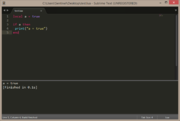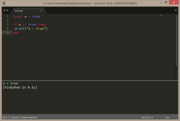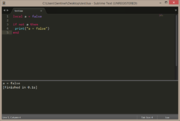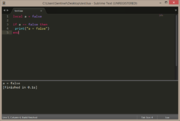Difference between revisions of "Basic lua: Operators"
From The Official Visionaire Studio: Adventure Game Engine Wiki
| Line 28: | Line 28: | ||
{| class="ts" | {| class="ts" | ||
|- | |- | ||
| − | ! Example 2: if condition is true (method 2) | + | ! Example 2: if condition is true (method 2) !! |
|- | |- | ||
| <syntaxhighlight> | | <syntaxhighlight> | ||
| Line 41: | Line 41: | ||
{| class="ts" | {| class="ts" | ||
|- | |- | ||
| − | ! Example 3: if condition is false (method 1) | + | ! Example 3: if condition is false (method 1) !! |
|- | |- | ||
| <syntaxhighlight> | | <syntaxhighlight> | ||
| Line 54: | Line 54: | ||
{| class="ts" | {| class="ts" | ||
|- | |- | ||
| − | ! Example 4: if condition is false (method 2) | + | ! Example 4: if condition is false (method 2) !! |
|- | |- | ||
| <syntaxhighlight> | | <syntaxhighlight> | ||
Revision as of 15:03, 20 August 2014
Lua operators are expressions used to perform calculations or to pass arguments between different value types.
Conditional Operators
| if | Query if something does or does not meet a certain condition. |
| else | Do something else if the query condition was not met. |
| elseif | Used to add additional if queries, if the initial query condition was not met. |
| end | This is used to close various queries or functions; there must be the same amount of end as if; except in instances where elseif has been used. |
| Example 1: if condition is true (method 1) | |
|---|---|
local a = true
if a then
print("a = true")
end |
| Example 2: if condition is true (method 2) | |
|---|---|
local a = true
if a == true then
print("a = true")
end |
| Example 3: if condition is false (method 1) | |
|---|---|
local a = false
if not a then
print("a = false")
end |
| Example 4: if condition is false (method 2) | |
|---|---|
local a = false
if a == false then
print("a = false")
end |



